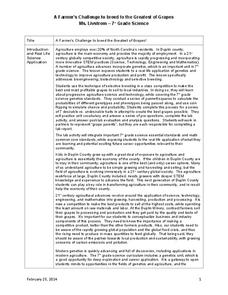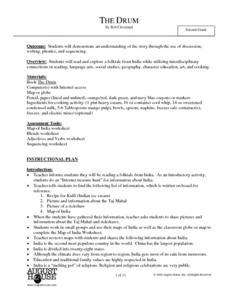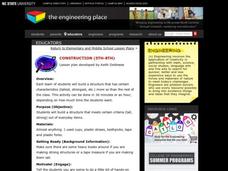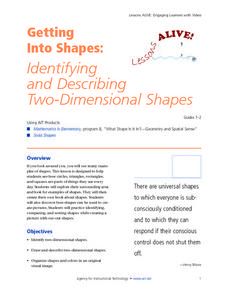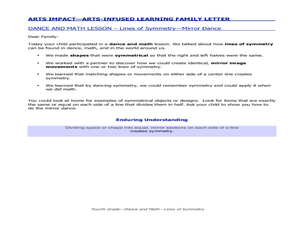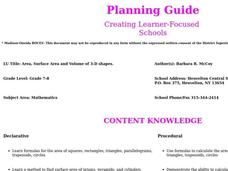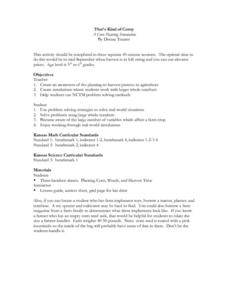EngageNY
Piecewise and Step Functions in Context
Looking for an application for step functions? This activity uses real data to examine piecewise step functions. Groups create a list of data from varying scenarios and create a model to use to make recommendations to increase revenue.
Visa
Rookie Lesson Module — Financial Football
Score a touchdown with an exciting game of financial football! Middle schoolers choose their favorite teams and play a virtual game of football as they answer various questions about economics.
National Park Service
It Was a Very Good Year
Waterton-Glacier International Peace Park includes whitebark pines that are over 1,200 years old, meaning they have been there since before medieval times. The second lesson of five details how to read tree rings for climate change and...
Space Awareness
Britannia Rule the Waves
Could you determine longitude based on measuring time? Early explorers used a longitude clock to do just that. Scholars learn about early exploration and the importance of the invention of the clock. Then pupils build their own longitude...
Space Awareness
History of the Universe
Your pupils may believe that you and their parents are the oldest things in the universe, but surprise! There are elements of the universe that are even older. Elementary scientists create a class timeline to demonstrate the expansive...
Space Awareness
The Sun Compass of the Vikings
Evidence shows the Vikings likely navigated by using a simple sundial to find their course. Videos, a short story, and discussion help bring this time period to life as they study European history with a hands-on experiment. Scholars...
Rainforest Alliance
Investments in Forest Carbon
One hundred metric tons of CO2 can accumulate in one acre of forest over time—that's a lot of carbon! In the activity, groups of middle school learners determine what makes forests important. They then solidify the concept by using a...
Concord Consortium
Leap Years and Calendars
How many birthdays do leap year babies have in a lifetime? Learners explore the question among others in a lesson focused on different calendar systems. Given explanations of the Julian, Gregorian, and Martian calendars, individuals use...
Kenan Fellows
A Farmer’s Challenge to Breed to the Greatest of Grapes
What does your class know about GMOs? Are they savvy to selective breeding? Challenge young minds to engineer the greatest crop of all time using a hands-on genetics unit. Learners discover the good and bad details of selective breeding,...
K12 Reader
The Art of M.C. Escher
Show your class one way in which art and math are related by teaching them about M.C. Escher. Class members read a brief passage and then respond to five related questions.
August House
The Drum
Take a journey to India with a read aloud of The Drum: A Folktale from India by Rob Cleveland. Make connections to the story's theme by building and practicing drums, role playing story characters, and practicing skills in phonics, math,...
SF Environment
Sort and Color!
Sorting is a very important skill that can be used in math and even science. Learners get familiar with some environmentally friendly vocabulary terms as they practice separating objects that can be recycled from those that can't. They...
Project Articulate
Textured Landscapes with Grant Wood
Explore the world of textured landscapes through the eyes of the famous artist, Grant Wood. Here is an elementary art lesson in which scholars learn about Grant Wood's life, view his work, draw their own textured landscape, and then...
North Carolina State University
Construction
Engineering design projects serve as great opportunities for collaborative problem solving. In this case, learners work in small groups designing, building, and eventually testing a structure that meets a teacher-specified objective. It...
Teach Engineering
Magical Motion
Make solutions to projectile motion problems magically appear using equations. Pupils watch a clip from a Harry Potter movie and find the length of time it takes for a remembrall to fall into Harry's hands. They use a projectile motion...
Curated OER
Attributes of Polygons: Stretchy Shapes
Fourth graders use dancing methodology in a polygon and shape activity. In this shape and dance instructional activity, 4th graders discuss shapes in dance, math, and everyday life. Students use dancing activities to recognize and...
Curated OER
Getting Into Shapes: Identifying and Describing Two-Dimensional Shapes
Young scholars examine their classroom to find examples of various types of shapes. After identifying and describing the various shapes, they draw as many as they can on a piece of paper. They organize them into an image based on their...
Curated OER
Lines of Symmetry - Mirror Dance
Fifth graders analyze how to divide space or shape into mirror sections to create lines of symmetry. In this lines of symmetry lesson, 5th graders discuss symmetry in dance, math, and living. Students participate in a dance warm-up and...
Curated OER
"A Typical Day at Seaworld" one day visit
Explore the business side of careers in zoological or marine parks. Learners use the internet, field trips, and their research skills to develop an understanding of what skills are needed to work in an animal park environment.
Curated OER
Area, Surface Area and Volume of 3-D Shapes
Math whizzes examine the relationship between area and volume and the relationship between a 3-D shape and its surface area. Following discussion and practice, pupils participate in a project in which they design packaging for a new...
Curated OER
Applying Central Tendency
Twelfth graders calculate the mean, median, and mode of various wages. They apply these skills to asking for pay raises. They discuss whether the mean, median, or mode provide the highest wage increase.
Curated OER
In the Ballpark
Middle schoolers practice estimation skills with the video series "Interactions: Real Math, Real Careers". They complete a hands-on activity for estimating large numbers.
Curated OER
That's Kind of Corny!
Students apply math skills to determining how much corn seed to plant in 100 acres. They compute the amount of weed killer needed and after totaling how many bushels per acre they harvest, they calculate their profits.
Shodor Education Foundation
Volume of Prisms
Explore the concept of volume of prisms using an applet to perform the calculations. The link to the interactive applet is embedded into the lesson plan as well as a link to associated data sheets. Get your math class to the computer lab...










